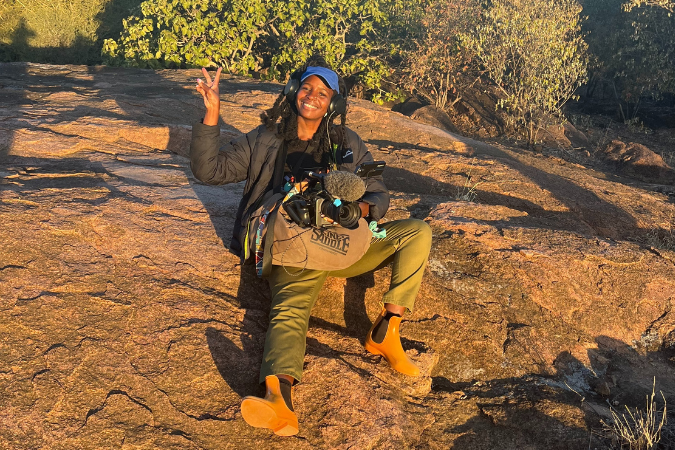|
3. ‘Matabeleland’ weaves a powerful love story into a deeply personal journey. What drew you to tell Chris and Dumi’s story in this way, and what do you hope audiences take away from it?
What drew me to their story was definitely Chris himself. There’s just something about him that pulls you in, you want to get to know him. I was curious to look at his life beyond what had happened with his father.
Then, meeting Dumi changed everything. She became like a mirror of Chris’ life, the consequences, the effects of the decisions he had made. There was no way we could tell his story without telling hers too because she’s such a big part of his world. I was honestly surprised by how open they both were and how candid they could be, even during arguments or when they were vulnerable. You don’t often see people being that raw, but as time grew, they really let me in.
A lot of the stories I’ve told have always been personal, just me with my camera and the subject. That style naturally carried over into this film too. It’s about giving people space to just be and being patient enough to let the story unfold. I wasn’t trying to force a narrative or make the film about a specific lesson or message. Instead, it’s more about allowing people to feel seen, which is why I make films in the first place.
Closure is a big theme in the film, how we get it, and why it’s necessary. I think people who watch the film will understand why it’s so important for Chris to take this journey to find his father. And when it comes to Chris and Dumi’s relationship, whether people like it or not, a lot of us can relate to it or have been in a similar situation at some point.
I’m not really aiming to teach anyone a lesson or say, “Here’s what you should or shouldn’t do.” It’s more about giving recognition to stories that make people feel seen and heard. As Africans, we don’t often get to watch something that really reflects our experiences. It’s still rare for me to see stories from my home country that feel familiar. That’s one of the main reasons I make films, just to help people feel less invisible in this world.
So, if people can watch the film and resonate with even one of the characters or situations, then the job is done. It’s just about reminding people that their stories matter, that they matter.
4. If you could describe Matabeleland in just three words, what would they be?
I would say complicated, closure, and comfort.
5. As a Zimbabwean filmmaker sharing this story with the world, what does it mean to you to bring Matabeleland to the global stage and what are your expectations for how people will receive it back home?
I think for audiences who aren’t as familiar with the region, the film will be quite enlightening. I hope it brings a newfound understanding of what people from Matabeleland have gone through and how they feel about it today.
For those who are from Matabeleland, I think they’ll appreciate seeing their story on the global stage and feel a sense of recognition like, “Yes, the spotlight is on us.” A lot of our stories in the past have come from one lens, often very political and focused on problems rather than solutions. And too often, those stories have been told by outsiders.
What makes Matabeleland different is that it’s an insider’s perspective. It’s personal, and it feels a lot more homegrown. I really hope that resonates with people, especially those from Matabeleland.
6. With the film about to premiere and the world finally getting to see it, what comes next for you?
My purpose remains the same: to help different communities feel seen and to counter some of the narratives I’ve encountered in the world.
I’m also excited to share that I’m currently in production on Copper Queens with LBx Africa, working again with Sam Soko. Sports is a big passion of mine, so I’m really looking forward to telling that story and seeing how it resonates. Plus, I’m hoping to work more in fiction over the next year and continue exploring new ways to tell stories.
With ‘Matabeleland’, I’m just looking forward to seeing how the film lives and breathes in the world. I hope it becomes a conversation starter, whether that’s about African manhood, masculinity, fatherhood, closure, the trauma of the region, or the immigrant experience. There are so many communities that could and will connect with this story, and I’m excited to see how they engage with it.
I also think the film will have a different life depending on where it’s shown. In Northern Europe, it might land one way, while on the continent it will be a whole different experience. We’re planning community screenings, and mobile cinemas, and taking the film into villages, moving beyond traditional cinema spaces. It’s going to be interesting to see how people interact with it in those settings, and I just hope it will spark memories, forge a connection, start a new conversation or just make people reflect.
|
